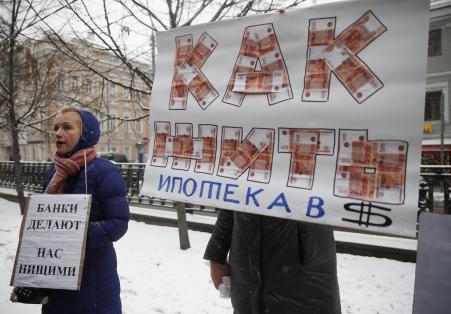By Kukil Bora -
The Central Bank of the Russian Federation, also known as the Bank of Russia, has announced that it will increase its key interest rate to 17 percent, up from 10.5 percent, with effect from Tuesday. The bank said that the move was an effort to boost the ruble and rescue the country’s sanctions-hit economy.
The ruble has dropped about 50 percent since January, hampered by falling oil prices and Western sanctions imposed on the country over the conflict in eastern Ukraine. The increase in the key interest rate is considered to be a desperate move by the central bank to defend the falling ruble, which threatens to raise Russia’s inflation to levels that could paralyze the country’s economy, The Associated Press (AP) reported.
“From 16 December 2014 the Bank of Russia Board of Directors decided to raise the Bank of Russia key rate to 17.00 percent per annum. This decision is aimed at limiting substantially increased ruble depreciation risks and inflation risks,” Bank of Russia said in a statement on Tuesday.
Although the decision triggered an immediate gain in the ruble, with one-month ruble forwards up 1.6 percent in Asian trading, some analysts said that the struggling Russian economy is unlikely to manage such high rates for long, Bloomberg reported, adding that the move by the country’s central bank is the biggest rate hike since 1998.
“This move symbolizes the surrender of economic growth for the sake of preserving the financial system,” Ian Hague, co-founder of New York-based Firebird Management LLC, told Bloomberg. “It’s the right move to make, and it wasn’t easy to make it.”
Russia has reportedly spent $80 billion in an unsuccessful move to stabilize the currency, which is now trading at about 65.60 to the dollar. It breached the 64.00 level for the first time on Monday.
According to Barry Eichengreen, an economist at the University of California, Berkeley, the Russian central bank has raised the key interest rate to attract investors, but the move will not solve the underlying issues affecting the Russian economy, he added, according to AP. Eichengreen also noted that Russia relies heavily on petroleum revenues, leaving the country’s economy at the mercy of global financial markets, where oil is priced in dollars.
The price for a barrel of Brent crude oil was down 65 cents to $61.20 on Monday. Earlier in the session, it had fallen to a session low of $60.28, the lowest price since July 2009, Reuters reported.
According to the U.S. Energy Information Administration, oil and natural gas sales accounted for 68 percent of Russia's total export revenues in 2013. Earlier on Monday, the Russian central bank had said that it expected the country’s economy to shrink 4.5 percent to 4.7 percent in 2015 -- the most since 2009 -- if oil prices averaged $60 a barrel in 2014.
“If today’s measures fail to stem the ruble rout, there is a high probability that policy will veer in a more unorthodox direction,” Alexander Kliment, an analyst at the Eurasia Group, said in a research note obtained by The New York Times. “Some top advisers to Putin are openly hostile to rate hikes.”
